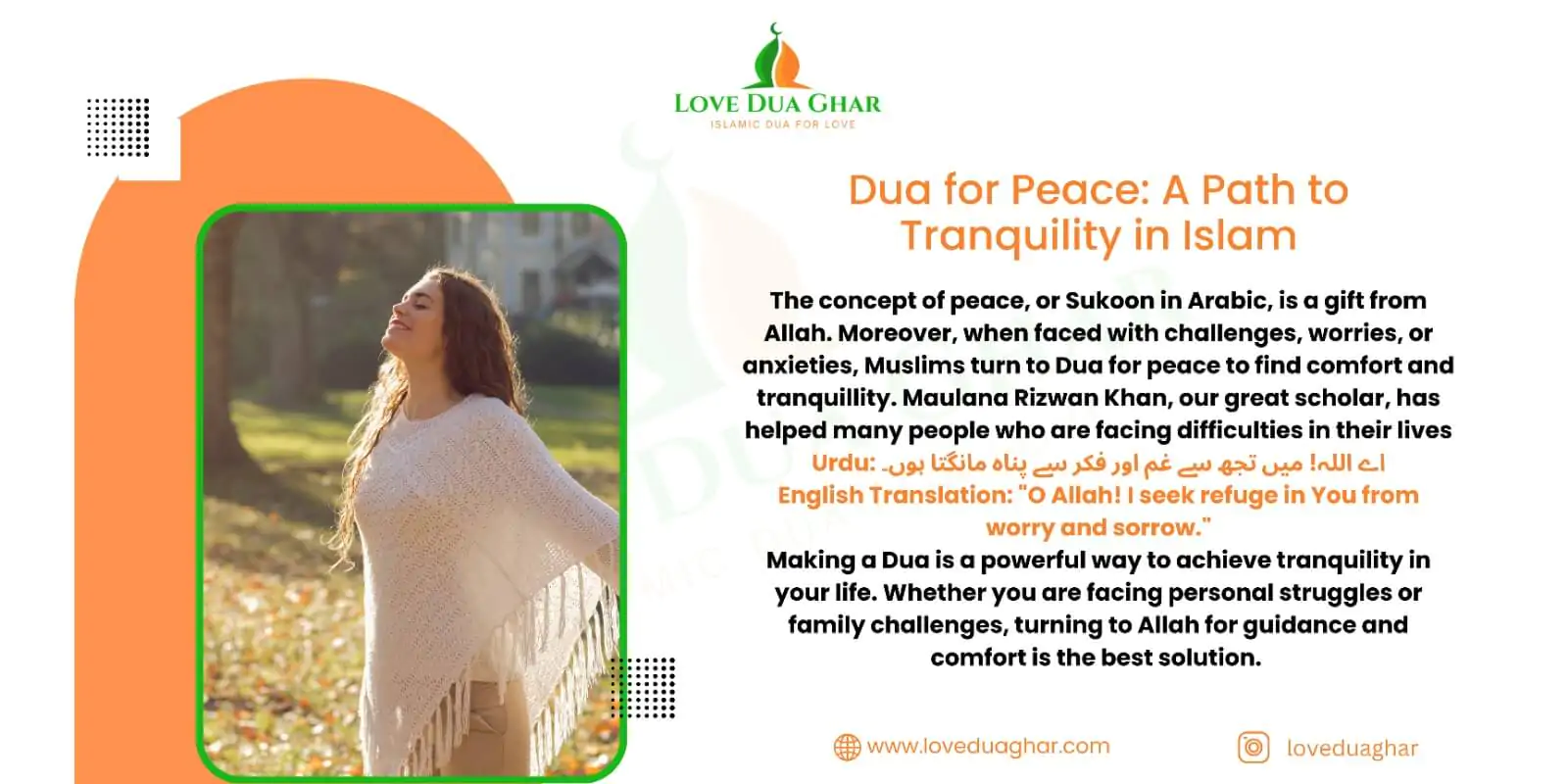A warm welcome to all our valued readers. In Islam, seeking peace in our hearts, minds, and lives is crucial because it brings comfort and stability. The concept of peace, or Sukoon in Arabic, is a gift from Allah. Moreover, when faced with challenges, worries, or anxieties, Muslims turn to Dua for peace to find comfort and tranquillity. Maulana Rizwan Khan, our great scholar, has helped many people who are facing difficulties in their lives. With his guidance and Allah’s blessings, they live happy and peaceful lives. If you have any questions or problems, you can contact Loveduaghar for help from our scholar Rizwan Khan.
These Dua are powerful prayers that ask Allah for inner calmness and relief from stress. In this article, we will explore some essential Duas for peace, how to recite them, and the significance of seeking peace in Islamic teachings.
What is the Importance of Dua for Peace?
The search for peace is a fundamental aspect of human life. Everyone experiences moments of distress, fear, or worry. However, in Islam, peace comes through sincere faith and trust in Allah. Additionally, making a Dua allows a person to connect directly with Allah, seeking His guidance and blessings. This act of asking for peace helps bring calmness to the mind, body, and soul.
Prophet Muhammad (PBUH) frequently made Duas, asking Allah for peace and protection from anxiety. His practices serve as an example of how Duas can comfort us in challenging times. The act of reciting a Dua reassures the believer that Allah’s mercy and protection are always near.
Why Make Peace Through Dua
- Life’s struggles, uncertainties, and fears can sometimes feel overwhelming.
- Duas serve as a refuge for believers, offering comfort in challenging times.
- They strengthen one’s faith and remind us that only Allah can provide true peace and tranquility.
- Reciting a Dua helps keep the heart firm in belief, reduces negative thoughts, and increases patience.
- Duas can be recited for personal peace, family peace, or peace in the community.
- The power of prayer is a source of hope and light during difficult times.
Essential Dua for Peace from Anxiety
The following is a powerful Dua that the Prophet Muhammad (PBUH) often used to seek relief from stress and anxiety:
Arabic: اللّهُمَّ إِنِّي أَعُوذُ بِكَ مِنَ الهَمِّ وَالحُزْنِ
Urdu: اے اللہ! میں تجھ سے غم اور فکر سے پناہ مانگتا ہوں۔
English Translation: “O Allah! I seek refuge in You from worry and sorrow.”
This Dua asks Allah to protect the heart from negative emotions like sadness and anxiety. As a result, it serves as a beautiful reminder that Allah’s mercy can heal even the deepest worries.
The Role of Patience in Achieving Peace
Patience (Sabr) is crucial in Islam for achieving peace. The Quran repeatedly encourages believers to be patient and steadfast. Reciting Duas for peace strengthens patience and, in turn, helps individuals endure trials without losing hope. Moreover, being patient does not mean avoiding action; it means taking the right steps while trusting in Allah’s wisdom.
The Prophet Muhammad (PBUH) faced many challenges but remained calm and patient, relying on Duas to find peace. This is why Muslims should follow his example by seeking peace through patience and persistent prayer.
Simple Steps to Recite a Dua
To make a Dua, follow these simple steps:
- Perform Wudu (Ablution): Make sure you are in a state of purity.
- Choose a Calm Space: Find a quiet place to sit and focus.
- Raise Your Hands: Raise your hands towards the sky as a sign of submission.
- Begin with Praise: Start the Dua by praising Allah and sending blessings upon the Prophet Muhammad (PBUH).
- Ask for Peace: Clearly ask for peace using a specific Dua or your words.
- Have Faith in Allah: Be confident that Allah hears your prayer and will respond.
- End with Gratitude: Thank Allah for His blessings and mercy.
Benefits of Reciting Dua
Reciting a Dua has many spiritual and emotional benefits. Not only does it calm the heart, but it also helps build a strong connection with Allah. Here are some key benefits:
- Inner Calmness: Making Duas for peace helps remove negative thoughts and brings mental tranquility.
- Spiritual Growth: Duas strengthen faith and bring one closer to Allah.
- Stronger Resilience: Reciting Duas during tough times builds patience and helps a person endure difficulties.
- Sense of Hope: A Dua for peace fills the heart with hope and positivity, allowing one to focus on the blessings from Allah.
Conclusion:
Making a Dua is a powerful way to achieve tranquility in your life. Whether you are facing personal struggles or family challenges, turning to Allah for guidance and comfort is the best solution. Consequently, peace will surely follow.. Reciting the essential Duas mentioned in this article can help you find the calmness you seek. Remember, peace comes from Allah alone, and maintaining faith, patience, and trust will bring you closer to that serenity.
Therefore, by following these practices and regularly making Duas for peace, you can experience a life filled with calmness, contentment, and Allah’s blessings. Keep your heart focused, make Dua, and trust in Allah’s mercy. Peace will surely follow.
Frequently Asked Questions (FAQs)
Q1: How can I make a Dua for peace in my life?
A1. To make a Dua, begin by performing Wudu (ablution) to ensure purity. Find a calm and quiet place where you can concentrate without distractions. Start your Dua by praising Allah and sending blessings upon Prophet Muhammad (PBUH). Then, sincerely ask Allah for peace using a specific Dua or your words.
Q2: Why is it important to recite a Dua for peace during difficult times?
A2. Reciting a Dua during tough times helps strengthen your connection with Allah and provides spiritual comfort. It allows you to ask for guidance, protection, and relief from worries. A sincere Dua can calm a troubled heart, remove negative thoughts, and remind you that Allah’s mercy is always near.



